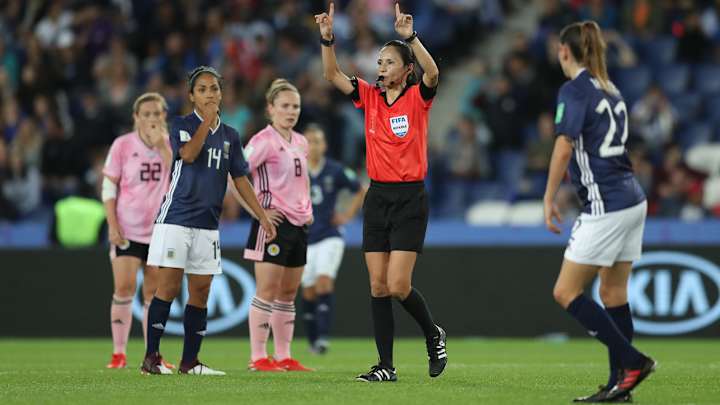As VAR Shows at Women's World Cup, This is the New Normal

The 2019 Women's World Cup has been brought to you by three letters: V. A. R.
The mandate of VAR–video assistant referees–was not to become the story of the competition where it's used but instead to rectify incorrect calls and ensure the deserving parties are rewarded and undeserving ones are punished. Remove controversy–don't add to it.
Well, that hasn't quite been the case in France over the last two-plus weeks.
On three occasions (South Africa vs. Spain, Norway vs. France, Nigeria vs. Germany), follow-throughs on challenges inside the box that otherwise looked innocuous in realtime have been flagged for review and ultimately turned into penalties. That players of the supposedly aggrieved teams didn't show a hint of protest after the fouls in question were committed dictates plenty about how unexpected those game-changing calls wound up being. It's not that kicking an opposing player in the box shouldn't be whistled, but it's always going to look different and more flagrant–not to mention out of context–when slowed down on replay.
On two massive occasions, and three in total, goalkeepers have been flagged for leaving the goal line too early on penalty kicks, resulting in both retakes–which have shaped the field of teams that reached the knockout rounds and where in the bracket they've gone–and yellow cards. The excessiveness of the rule was highlighted when IFAB, the rules-making association, instituted a hold on the regulation, so that if it occurred in a penalty shootout during the knockout stage, goalkeepers wouldn't be carded (and ejected) left and right. England's Premier League, which is instituting VAR next season, immediately came out saying that goalkeeper encroachment won't be subjected to review, leaving that to referees to decide in the moment. There was a choice in the matter, and FIFA chose to act as it did in time for the biggest competition.
"It kind of tells you everything you need to know," former England international and FOX TV analyst Eniola Aluko said following Germany's 3-0 win over Nigeria in the round of 16 on Saturday, in which VAR was consulted on the first two goals of the match. "The biggest league in the world is not going to implement this rule."
This wasn't an issue last summer in Russia, when VAR made its first foray onto a senior World Cup stage. The rules being emphasized were ones players had been accustomed to playing under for years, not ones being pushed to the front of the queue six days before the start of the competition. Some of the leagues where those players were employed had already instituted the technology, so they were used to the referee making the rectangular motion with his pointer fingers and the circumstances under which it was happening.
The women, for various reasons, haven't been exposed to that before, but that was not a huge concern entering the competition, as players and coaches pleaded for the implementation of VAR for months before FIFA finally acquiesced. What they didn't expect, however, was the ways in which it would be used and the rules it would be looking to enforce.
On top of everything else, the review process is taking a lifetime to complete. Last summer, referees would either trust the VAR's eyes to get the call right or instantly go take a look for themselves. It wasn't perfect every time, but it was a largely seamless process. All of the fears going into the competition were, for the most part, allayed. France 2019 has been marked by lengthy reviews that first start with a conversation between the VAR and referee and then, after considerable time, the referee running over to the side monitor to take a look. The instincts needed to speed things up just aren't there.
"I don't remember lengthy ones like this at the men's World Cup in Russia," agitated FOX broadcaster JP Dellacamera remarked during a review in Norway and Australia's last-16 matchup on Saturday.
This summer, VAR has turned into the soccer equivalent of driving speed cameras. It's there to hold its targets accountable for things that previously might have been let go either in the spirit of the game or because ultimately, in realtime, there was no hint of a major infraction. Is barely going over the speed limit on a clear road really worth punishing, even if it's technically illegal? You'd have rarely been flagged for that prior to the intervention of technology, when sensible subjectivity was still a prevalent factor. But such is life at the Women's World Cup, where it's unfortunate players are being exposed to the new points of emphasis for the first time–and their World Cup fortunes are being determined as a result.
"It seems like a bit of an experiment," Aluko said. "It seems like a bit of a guinea pig."
Aluko isn't wrong, and these players are being used to establish the new normal. So, goalkeepers, keep at least a foot on the line during penalty kicks. Defenders, keep your arms from being extended at all and watch the follow-throughs on your challenges and clearance attempts.
Regardless of what you'd been taught to do before, the cameras are watching.

Avi Creditor is a senior editor and has covered soccer for more than a decade. He’s also a scrappy left back.